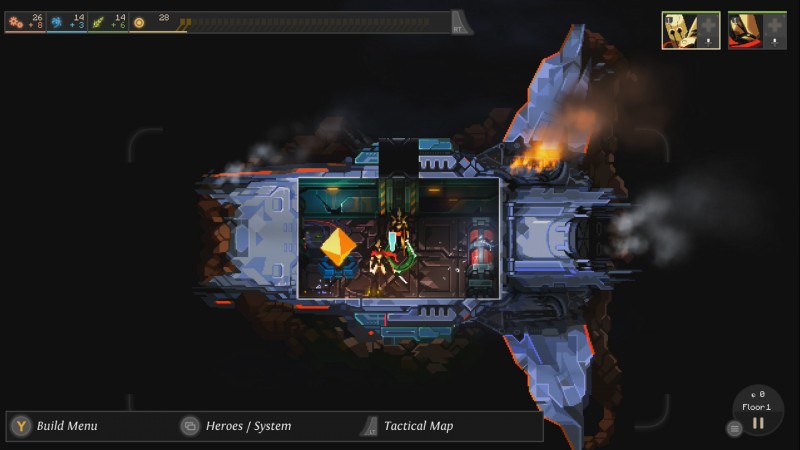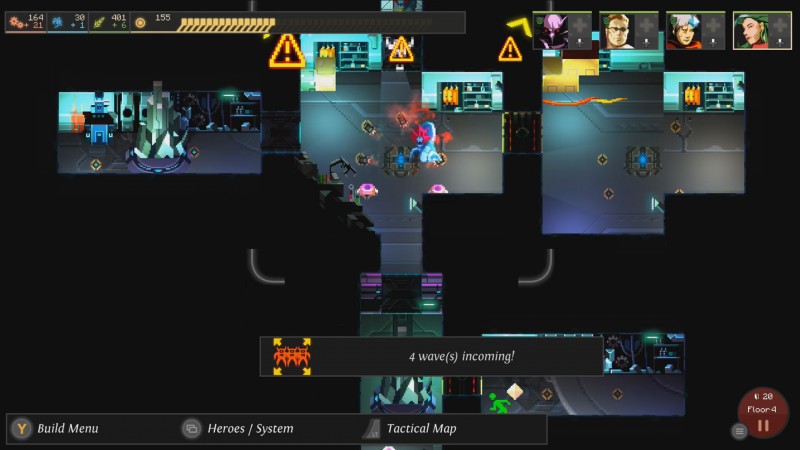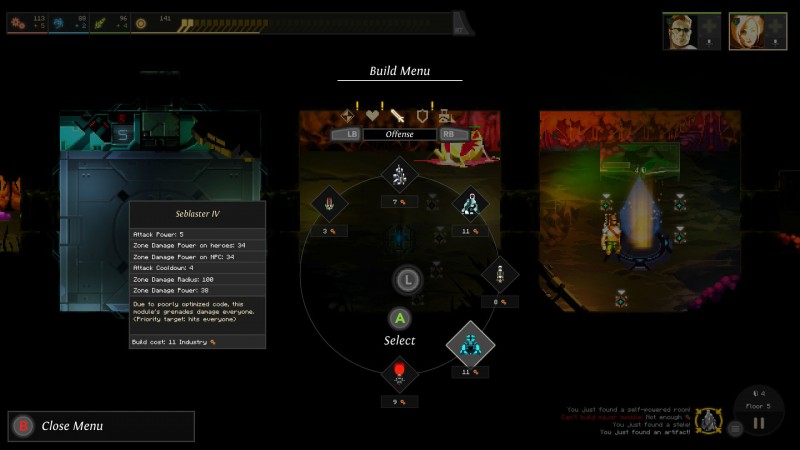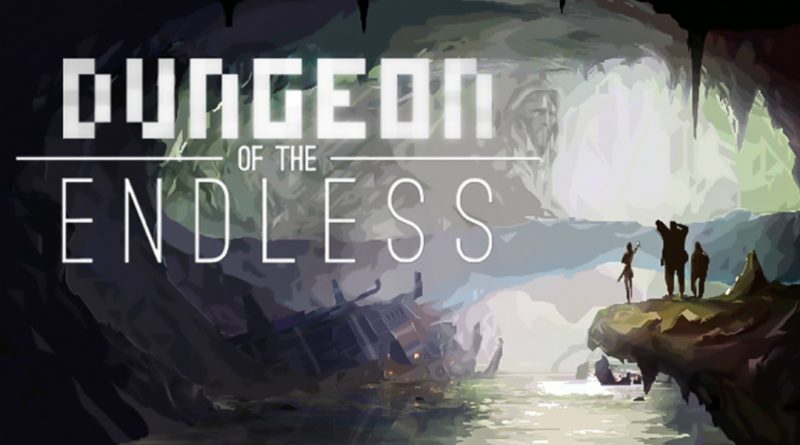Dungeon of the Endless | Review
There’s something a little bit odd about the folks over at Amplitude Studios, developer of Dungeon of the Endless. This is a tactical strategy rogue-like RPG tower defense adventure game, influenced by any number of games from recent years and days gone by. Dungeons are pure high fantasy, waves of alien hordes are pure sci-fi.
It’s crazy and overwhelming and original and unique and hectic and slow-paced and… it shouldn’t work. But, somehow, it does. Somehow, those odd folks have crammed a dozen different influences into one pixelated pot and have made it work.
With a game that incorporates so many disparate elements it’s difficult to know where to start. So let’s start at the beginning. A spaceship crash lands on a strange, alien world and the only escape is to climb through twelve levels of dungeons – each level filled with aliens bent on the demise of the crash survivors. To escape each level, the player’s squad of heroes must explore room after room to locate the elevator to the next. Having located the elevator, the heroes must transport the crystal – needed to power eventual escape from the alien world – safely to it.

While the Dungeon has twelve levels, each new room is a level in itself. When a room has been powered up using the precious resource Dust, the major and minor slots in that room become active, ready to accept whatever modules our heroes plug in. Major modules are used to level up the squad, researching and building upgrades, and providing food to heal the heroes. Minor modules are for defending that room against the aliens who may pour in as soon as any door from that room is opened. Thus each room becomes an exercise in strategic tower defense, placing turrets to weaken the aliens and allowing the heroes to dispatch them while taking minimal damage. With rooms explored, modules set and attackers repelled it is time, then, to move on to the next room and towards (hopefully) the Crystal and the elevator.
Each room discovered counts as a turn and with each turn your squad reaps the resources from all major modules placed. How that resource is put to use is critical. As you level up the squad it becomes apparent that their protection from the aliens is paramount, and not just because losing all squad members means game over. Having carefully developed each squad member’s skill set in an RPG-like manner, the emotional investment in each is far greater than simply protecting the sanctity of a simple health bar. As you explore you’ll need to make use of the usual video game tropes – the tank, the speedster – and losing a key squad member can mean disaster for your preferred strategy.
Direct control over your heroes is limited to moving from room to room, and placing them within each room ready to defend themselves from the advancing horde. Heroes can be healed and have up to two of their special abilities activated, making for an intriguing balance between the defensive turrets you can deploy and your heroes’ available special abilities. As doors are opened and aliens flood in they will relentlessly pursue heroes from room to room until destroyed, so your placement of heroes, the skills at their disposal, and the defensive turrets all play a part in success or failure.

Dust is life, and the only way to find it is to explore new rooms. There are more rooms than Dust, though, so every door opened brings with it a chance for aliens to pour in. Once the elevator has been found, the next phase of the game begins – forming a strategy to transport the crystal to the elevator. As soon as the crystal is touched, endless waves of aliens will spawn in any unpowered room. There’s never enough Dust to power all the rooms and so you have to make interesting choices about which rooms to power, where to deploy your defenses, and the path to take from the Crystal to the elevator.
Every decision made in this game has a consequence, but nothing comes close to the tension felt every time a door to a new room is opened. Not knowing what is behind each door – but knowing it could be grisly death or at least the undoing of some very carefully-laid plans – is a delicious uncertainty. There are no checkpoints to go back to, no reloading a recent save. You live or die by the opening of each door. It’s always just one more door. The tension is focused and channeled by the aesthetic of the game – the bright pixel art style throws into sharp relief the dimly-lit doorways from which aliens could spew, while the music and sound effects are also suitably eerie.
It’s the sheer not knowing, though, that creates that tightness in your chest. There’s never enough Dust and always too many enemies for any run through a level to be comfortable, even on the easiest settings. As your squad advances towards the surface, aliens get nastier and resources get more scarce. There are new heroes to earn with more distinct specialisms, and the starting rules and conditions can be changed by changing the type of spaceship in which your squad crashes. The core game remains the same, though – there are no radical shifts that force you from a winning strategy – but that central, pivotal tension never disappears. The developer has done a solid job of taking this largely mouse-controlled Steam title and making it accessible using the Xbox One controller. The context-sensitive menus work well – just as well, as Dungeon of the Endless sports a bewildering amount of data – and cycling through options feels natural. Good effort.

Dungeon of the Endless incorporates a huge number of influences and genre-types, creating its own unique style and delivering a thoughtful, complex game wrapped up in pretty visuals. It is not, by any means, an easy game – or indeed an easy game to get to grips with. This is a game that requires a significant investment from the player, and that is a big ask. One of our testers simply couldn’t get to grips with it at all. If you like to have your hand held until you feel confident enough to let go, then this isn’t the game for you. However, if you live and breath strategy and fancy pitting your wits against the random number gods and hordes of evil aliens the Dungeon of the Endless might just be the game you’re looking for.
Dungeon of the Endless is available on Steam for £8.99, on Nintendo Switch for £17.99, from the Xbox Store priced £8.99, and from the PS Store priced £15.99.

